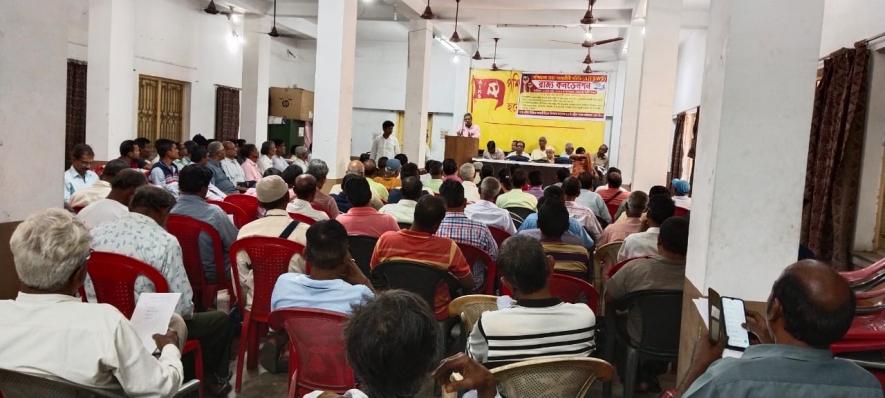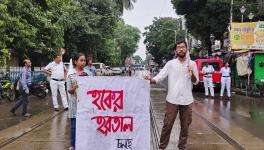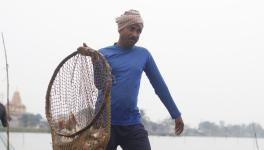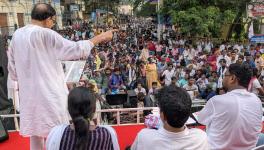Bengal Fishermen Demand Social Security, to Join Twin Delhi Rallies

AIFFWF west bengal state convention inkolkata on 21st march
Kolkata: Gour Sarkar (65) is enthused about joining the twin rallies by fishermen demanding social security in Delhi next month.
A resident of Chotomollakhali village, in Gosaba Block of West Bengal’s South 24 Parganas district, Sarkar’s boat landing certificate expires on March 31. “We do not have social security. Hospitals are located far and we can’t afford the cost of medical treatment either,” he tells Newsclick.
Frustrated with the lack of fish in the Sundarbans, he is against the destruction of coastal fishery due to the Centre’s SagarMala Project and the blue economy.
With no option left, Sarkar has decided to join other protesting fishermen in Delhi. More than hundreds of fishers recently met in Kolkata to demand photo identity cards for lakhs of inland and coastal fishermen, free education for their children and proper infrastructure in the villages at the All India Fishers and Fisheries Workers Federation (AIFFWF) and the Mazdoor Kisan Sangharsh rallies on April 3 and April 5, respectively.
More than 27 lakh fishermen in the state face a livelihood threat as cooperative laws are being eased in violation of the West Bengal Fisheries Act, 1984, union leaders alleged. There are about 3 lakh fishermen in the Sundarbans with another 1.5 million residents dependent on fishing for livelihood.
According to fishermen, the state government is opening up the sector to “inexperienced” persons affiliated with the ruling Trinamool Congress (TMC) and corporate entities. State cooperatives are allegedly awarding contracts to individuals posing as cooperatives instead of traditional cooperative societies.
“Traditional fishing communities like Majhi, Malo, Bauri, and Parmanik are losing ground to influential outsiders who are ruling party hooligans,” alleges Nantu Haldar, an inland fisherman.
The Sundarbans fishers feel that the Narendra Modi government’s Blue Revolution: Integrated Development and Management of Fisheries and the SagarMala projects are harming the ecology of the massive mangrove area and hampering fishing.
The Blue Revolution focuses on increasing fish production in inland and coastal areas. The SagarMala project aims to modernise ports and construct new ones and enhance their connectivity and promote coastal community development.
“The Centre is harming the ecology of the Sundarbans and hampering fishing in the area by allowing passage to ships,” fisherman Abul Gazi (65), of Samsernagar village, in Kalitala, North 24 Parganas, tells Newsclick. More than 50 ships are anchored between Hingalgunj and Samsernagar, where fishermen catch fish.
“The Blue Revolution is meant for big corporate entities. We will not benefit from it,” says Debasish Barman, of Hingalgunj Fisherman Community and secretary West Bengal AIFFWF.
“The size of trawlers fixed by the Central government is meant for big companies. Besides, small fishermen cannot bear the huge cost of increasing the size of the present trawlers to 20 feet,” he adds.
Besides, “restricting small fishers to 10 nautical miles from 200 nautical miles is also hampering fishing in the state and the country”, he says.
Big Indonesian trawlers allowed to fish in Indian waters under ASEAN Free Trade Agreement use modern solar searchlights to locate and net huge amounts of fish. Consequently, small fishermen are losing livelihood and forced to relocate to Chennai or Thiruvananthapuram as daily wagers.
In fact, in every household of the Sundarbans, several male members have migrated to other states in search of work. Hariprasad Roy (57), who has a fishing licence, is happy that both his sons have given up fishing. One of them is a civic police volunteer and the other is a daily wager in Chennai.
Several fishermen said that the West Bengal shores are open to corporate giants, like Reliance Industries, who are selling fish in the state’s retail markets. Traditional fishers, for example, in Jambudwip, where about 10,000 families are engaged in drying up fish, have no option but to switch to other professions.
“Building export-oriented units along the coastline will hamper fishing in the 7,500 km coastline of the country out of which 158 km is in West Bengal. The SagarMala project is hampering the ecological balance of the area and is forcing fishers to quit the profession,” Barman alleges.
Get the latest reports & analysis with people's perspective on Protests, movements & deep analytical videos, discussions of the current affairs in your Telegram app. Subscribe to NewsClick's Telegram channel & get Real-Time updates on stories, as they get published on our website.
























